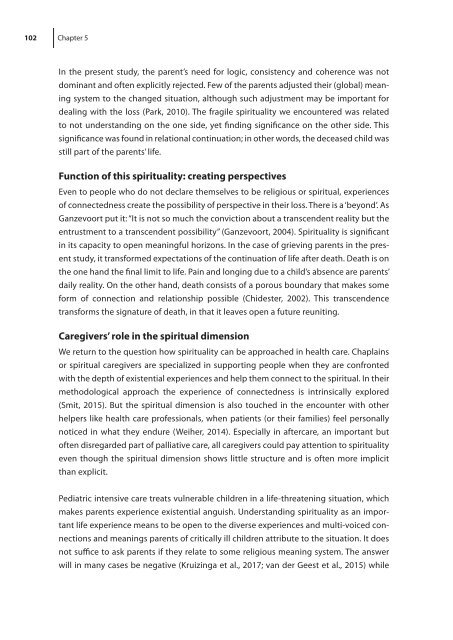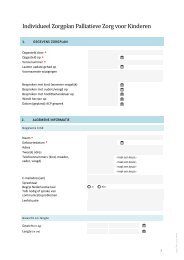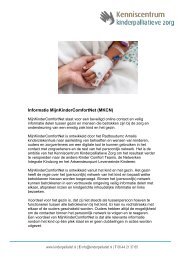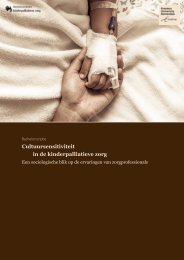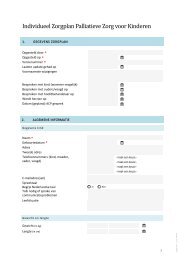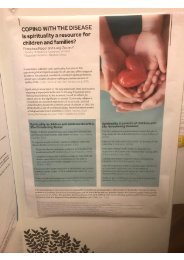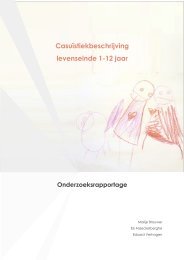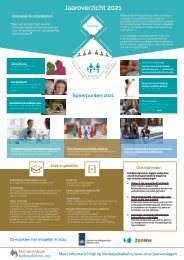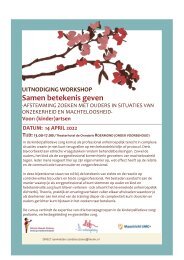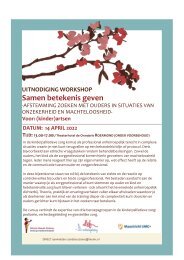Unveiling a fragile spirituality: Experiences of connectedness in pediatric palliative care
Create successful ePaper yourself
Turn your PDF publications into a flip-book with our unique Google optimized e-Paper software.
102 Chapter 5<br />
In the present study, the parent’s need for logic, consistency and coherence was not<br />
dom<strong>in</strong>ant and <strong>of</strong>ten explicitly rejected. Few <strong>of</strong> the parents adjusted their (global) mean<strong>in</strong>g<br />
system to the changed situation, although such adjustment may be important for<br />
deal<strong>in</strong>g with the loss (Park, 2010). The <strong>fragile</strong> <strong>spirituality</strong> we encountered was related<br />
to not understand<strong>in</strong>g on the one side, yet f<strong>in</strong>d<strong>in</strong>g significance on the other side. This<br />
significance was found <strong>in</strong> relational cont<strong>in</strong>uation; <strong>in</strong> other words, the deceased child was<br />
still part <strong>of</strong> the parents’ life.<br />
Function <strong>of</strong> this <strong>spirituality</strong>: creat<strong>in</strong>g perspectives<br />
Even to people who do not declare themselves to be religious or spiritual, experiences<br />
<strong>of</strong> <strong>connectedness</strong> create the possibility <strong>of</strong> perspective <strong>in</strong> their loss. There is a ‘beyond’. As<br />
Ganzevoort put it: “It is not so much the conviction about a transcendent reality but the<br />
entrustment to a transcendent possibility” (Ganzevoort, 2004). Spirituality is significant<br />
<strong>in</strong> its capacity to open mean<strong>in</strong>gful horizons. In the case <strong>of</strong> griev<strong>in</strong>g parents <strong>in</strong> the present<br />
study, it transformed expectations <strong>of</strong> the cont<strong>in</strong>uation <strong>of</strong> life after death. Death is on<br />
the one hand the f<strong>in</strong>al limit to life. Pa<strong>in</strong> and long<strong>in</strong>g due to a child’s absence are parents’<br />
daily reality. On the other hand, death consists <strong>of</strong> a porous boundary that makes some<br />
form <strong>of</strong> connection and relationship possible (Chidester, 2002). This transcendence<br />
transforms the signature <strong>of</strong> death, <strong>in</strong> that it leaves open a future reunit<strong>in</strong>g.<br />
Caregivers’ role <strong>in</strong> the spiritual dimension<br />
We return to the question how <strong>spirituality</strong> can be approached <strong>in</strong> health <strong>care</strong>. Chapla<strong>in</strong>s<br />
or spiritual <strong>care</strong>givers are specialized <strong>in</strong> support<strong>in</strong>g people when they are confronted<br />
with the depth <strong>of</strong> existential experiences and help them connect to the spiritual. In their<br />
methodological approach the experience <strong>of</strong> <strong>connectedness</strong> is <strong>in</strong>tr<strong>in</strong>sically explored<br />
(Smit, 2015). But the spiritual dimension is also touched <strong>in</strong> the encounter with other<br />
helpers like health <strong>care</strong> pr<strong>of</strong>essionals, when patients (or their families) feel personally<br />
noticed <strong>in</strong> what they endure (Weiher, 2014). Especially <strong>in</strong> after<strong>care</strong>, an important but<br />
<strong>of</strong>ten disregarded part <strong>of</strong> <strong>palliative</strong> <strong>care</strong>, all <strong>care</strong>givers could pay attention to <strong>spirituality</strong><br />
even though the spiritual dimension shows little structure and is <strong>of</strong>ten more implicit<br />
than explicit.<br />
Pediatric <strong>in</strong>tensive <strong>care</strong> treats vulnerable children <strong>in</strong> a life-threaten<strong>in</strong>g situation, which<br />
makes parents experience existential anguish. Understand<strong>in</strong>g <strong>spirituality</strong> as an important<br />
life experience means to be open to the diverse experiences and multi-voiced connections<br />
and mean<strong>in</strong>gs parents <strong>of</strong> critically ill children attribute to the situation. It does<br />
not suffice to ask parents if they relate to some religious mean<strong>in</strong>g system. The answer<br />
will <strong>in</strong> many cases be negative (Kruiz<strong>in</strong>ga et al., 2017; van der Geest et al., 2015) while


